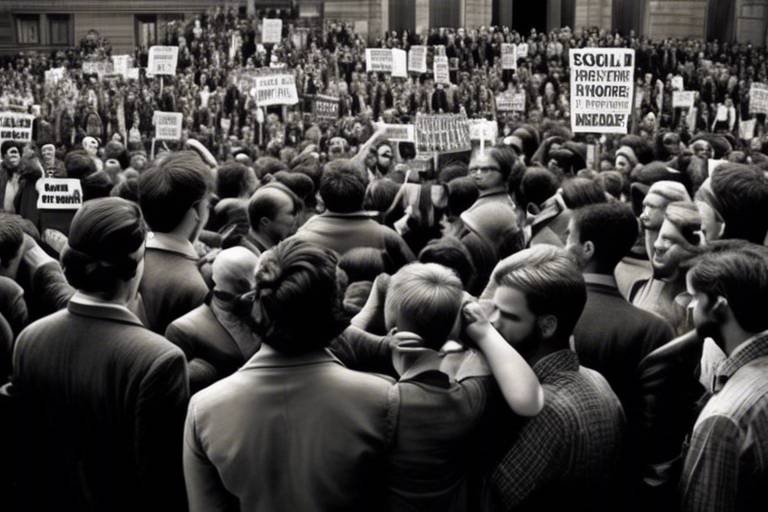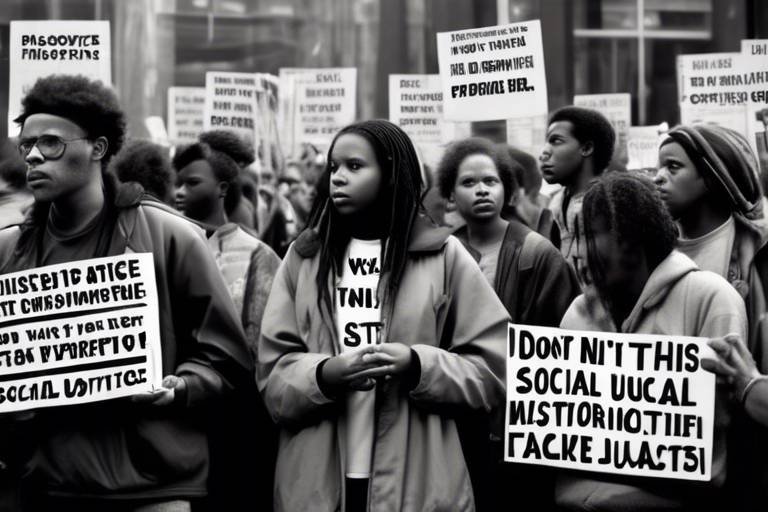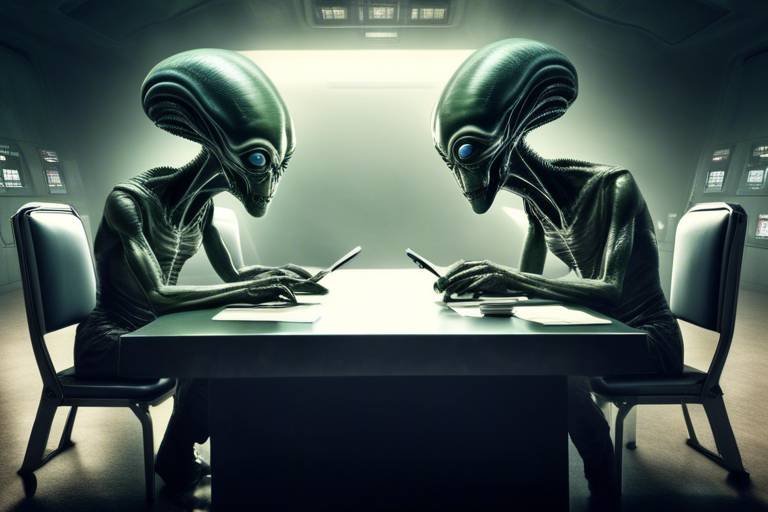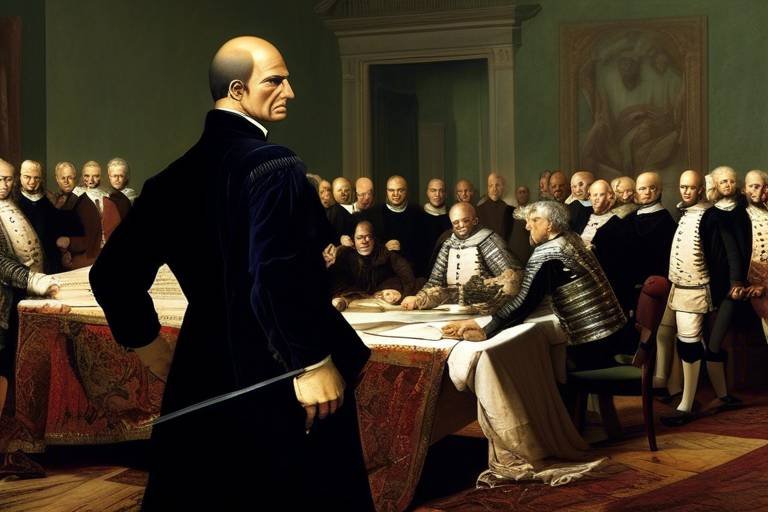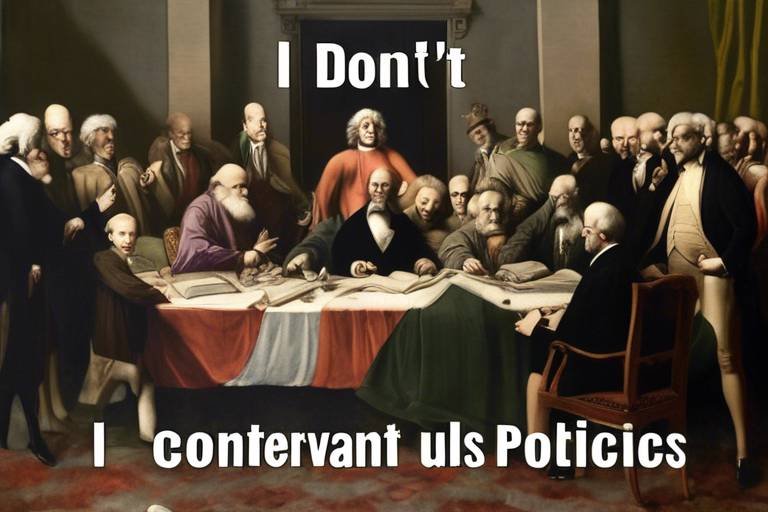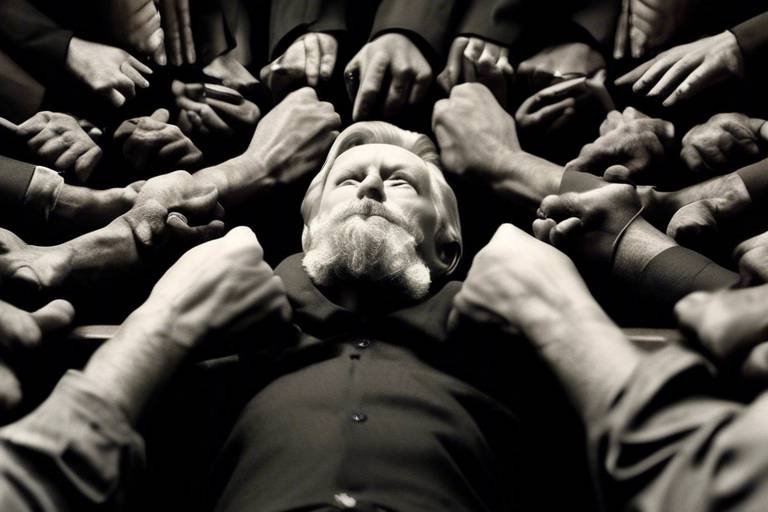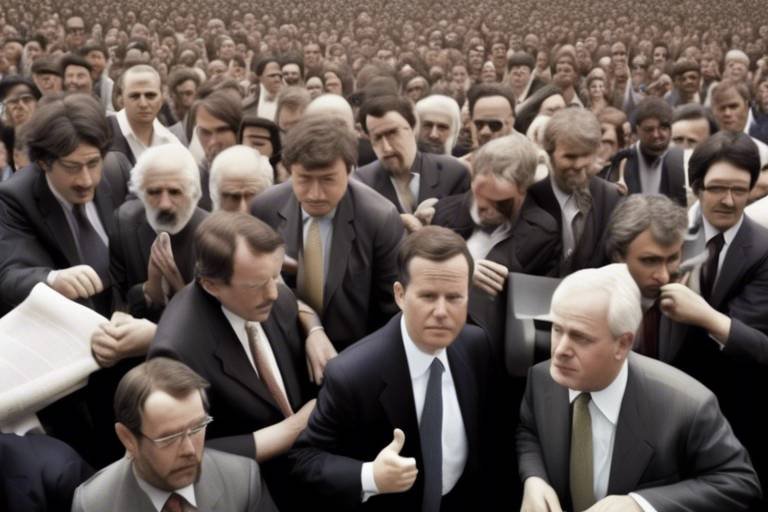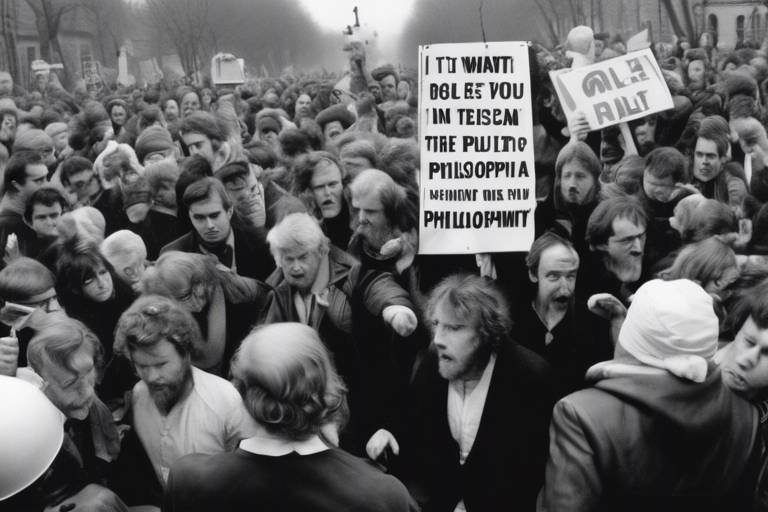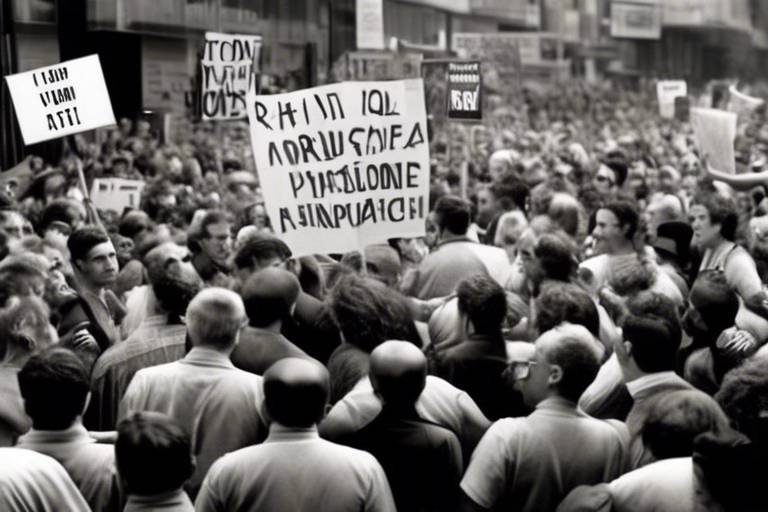Deconstructing Political Realism - A Philosophical Perspective
Political realism is a profound and often contentious framework that has shaped the way we understand power, governance, and human behavior throughout history. At its core, political realism posits that politics is governed by objective laws rooted in human nature, which often leads to a pragmatic, if not cynical, view of the world. This perspective challenges idealistic notions of politics that emphasize morality and ethical governance, offering instead a lens that prioritizes survival, power, and the often harsh realities of political life. As we delve deeper into the intricacies of political realism, we will explore its historical roots, the key theorists who have influenced its development, and the critiques it faces in contemporary discourse.
The essence of political realism lies in its recognition that human beings are inherently self-interested and that this self-interest drives political behavior. This understanding leads to a focus on the balance of power, national interest, and the necessity of strong leadership in the face of chaos and conflict. By examining the foundational ideas of political realism, we can better understand its implications for global politics today. As the world grapples with complex challenges such as climate change, terrorism, and economic inequality, the principles of political realism offer a stark reminder of the enduring nature of power struggles and the often uncomfortable truths about human nature.
In this exploration, we will also address the criticisms political realism faces, particularly regarding its perceived cynicism and moral ambiguity. Critics argue that by focusing primarily on power dynamics, political realism neglects the ethical dimensions of political action, which are increasingly relevant in our interconnected world. As we unpack the contributions of key figures like Machiavelli and Hobbes, we will also consider how their ideas resonate—or clash—with contemporary values and the pressing need for ethical governance. Ultimately, this philosophical perspective on political realism invites us to reflect on the delicate balance between power and morality, urging us to confront the uncomfortable truths that lie at the heart of political life.
Understanding the historical and philosophical foundations of political realism is essential for contextualizing its development and influence on modern political thought and practice. Political realism emerged as a response to the idealistic views that dominated political philosophy, particularly during the Enlightenment. Thinkers like Kant and Rousseau envisioned a world where reason and morality could guide political action, leading to peace and cooperation among nations. However, the tumultuous events of the 20th century, including two world wars and the Cold War, revealed the fragility of these idealistic visions, prompting a reevaluation of the assumptions underlying political theory.
The roots of political realism can be traced back to ancient philosophers such as Thucydides, whose historical accounts illustrated the brutal realities of power struggles in the Peloponnesian War. His insights laid the groundwork for later thinkers who would further develop the realist perspective. In the modern era, figures like Machiavelli and Hobbes brought a sharper focus on the darker aspects of human nature, arguing that the pursuit of power often necessitates morally questionable actions. This philosophical shift paved the way for a more pragmatic understanding of politics, one that acknowledges the complexities and often harsh realities of governance.
This section highlights influential figures in political realism, such as Machiavelli, Hobbes, and Morgenthau, examining their contributions and the evolution of realist thought. Each of these theorists brought unique insights that have shaped the realist tradition, offering a diverse array of perspectives on power, governance, and human behavior.
Machiavelli's pragmatic approach to power and morality laid the groundwork for political realism, emphasizing the importance of statecraft and the often harsh realities of political life. His seminal work, The Prince, serves as a realist manifesto that challenges idealistic notions of governance. In this text, Machiavelli articulates principles of power that advocate for a realistic understanding of human nature, suggesting that rulers must be prepared to act immorally when necessary to maintain their power and protect their states.
In The Prince, Machiavelli famously asserts that "the ends justify the means," a phrase that encapsulates the essence of political realism. This idea suggests that moral considerations may be secondary to the pursuit of power, leading to a pragmatic approach to governance that prioritizes effectiveness over ethics. For Machiavelli, the successful ruler must navigate the treacherous waters of politics with a keen understanding of human nature and the dynamics of power.
Machiavelli's work raises critical questions about the relationship between ethics and politics. He challenges the notion that moral behavior is always aligned with political success, suggesting instead that leaders must sometimes set aside ethical considerations to achieve their objectives. This perspective has sparked ongoing debates about the role of morality in political decision-making and the ethical implications of realpolitik in contemporary governance.
Hobbes' depiction of the state of nature as a war of all against all underscores the necessity for strong governance, reinforcing key realist principles about human behavior and authority. In his work, Leviathan, Hobbes argues that without a powerful sovereign to maintain order, life would be "solitary, poor, nasty, brutish, and short." This bleak view of human nature aligns with the realist perspective that emphasizes the need for authority to manage inherent conflicts among individuals.
Political realism faces significant critiques, particularly regarding its perceived cynicism and neglect of ethical considerations. Critics argue that this focus on power dynamics often leads to moral relativism, raising concerns about the ethical implications of realpolitik in international relations. As the world becomes increasingly interconnected, the relevance of political realism is challenged by global issues such as climate change, human rights, and transnational governance.
The critiques of political realism often center on its implications for ethics in politics. Detractors argue that a strict adherence to realist principles can lead to a disregard for moral considerations, resulting in policies that prioritize national interest over human rights and global welfare. This moral ambiguity raises important questions about the responsibilities of political leaders in an age where ethical governance is more crucial than ever.
In today's interconnected world, the application of political realism is challenged by global issues that require cooperation and ethical considerations. Climate change, for instance, transcends national borders and demands a collective response that realist principles may struggle to accommodate. As we navigate the complexities of modern governance, the principles of political realism must be reevaluated to address the pressing challenges of our time.
- What is political realism? Political realism is a theoretical framework in political philosophy that emphasizes the role of power, self-interest, and the often harsh realities of human nature in political behavior.
- Who are the key theorists of political realism? Key theorists include Niccolò Machiavelli, Thomas Hobbes, and Hans Morgenthau, each contributing unique perspectives on power and governance.
- What are the main critiques of political realism? Critics argue that political realism is overly cynical, neglects ethical considerations, and may lead to moral relativism in international relations.
- How does political realism apply to contemporary issues? Political realism's principles are challenged by global issues like climate change and human rights, prompting a reevaluation of its relevance in today's interconnected world.

The Origins of Political Realism
Understanding the historical and philosophical foundations of political realism is essential for contextualizing its development and influence on modern political thought and practice. Political realism emerged as a response to the idealistic notions that dominated political philosophy, particularly during the Enlightenment. Thinkers began to realize that the world of politics was not merely a stage for lofty ideals but rather a complex arena characterized by power struggles, human selfishness, and pragmatic decision-making.
The roots of political realism can be traced back to ancient political philosophy, where figures like Thucydides and Sun Tzu laid the groundwork for understanding politics as a conflictual and competitive endeavor. Thucydides, in his historical accounts, emphasized the role of power and fear in the relationships between states, famously stating, “The strong do what they can and the weak suffer what they must.” This sentiment resonates deeply within the realist framework, which prioritizes the interests of the state over moral considerations.
As we delve deeper into the historical context, we find that the Renaissance period played a pivotal role in shaping political realism. It was during this time that thinkers began to break away from the constraints of religious and moral dogmas that had previously dictated political thought. The emergence of the modern state, coupled with the decline of feudalism, created a new landscape where power dynamics became increasingly significant. This shift prompted scholars to consider the implications of state sovereignty and the necessity of a pragmatic approach to governance.
Political realism gained further traction in the 17th century with the works of Thomas Hobbes. His depiction of the state of nature as a chaotic environment where life was “solitary, poor, nasty, brutish, and short” highlighted the need for a strong, centralized authority to maintain order. Hobbes’ ideas reinforced the realist perspective that human beings are driven by self-interest, and thus, a powerful government is essential to prevent anarchy.
To summarize, the origins of political realism can be encapsulated in the following key points:
- Influence of ancient philosophers like Thucydides and Sun Tzu.
- The impact of the Renaissance on political thought.
- Hobbes’ theories on human nature and the necessity of authority.
Ultimately, political realism emerged as a response to the complexities of human nature and the realities of political life. It challenges us to confront the often uncomfortable truths about power, governance, and the motivations that drive political actors. As we navigate the intricacies of contemporary politics, understanding these origins provides a crucial lens through which we can analyze the ongoing relevance of realism in today’s world.

Key Theorists in Political Realism
Political realism has been shaped and defined by several key theorists whose ideas have profoundly influenced the way we understand power, governance, and human behavior in the political realm. Among these figures, Machiavelli, Hobbes, and Morgenthau stand out as pivotal contributors to the evolution of realist thought. Each of these thinkers brought unique insights that challenged prevailing idealistic notions and emphasized a more pragmatic approach to politics.
Machiavelli is often regarded as the father of modern political realism. In his seminal work, The Prince, he argued that the pursuit of power often necessitates morally ambiguous actions. His pragmatic approach to statecraft emphasizes that rulers must sometimes prioritize the stability and security of the state over ethical considerations. This perspective invites us to ponder: should leaders sacrifice ethical ideals for the sake of political expediency? Machiavelli's ideas not only challenged the romantic notions of governance but also laid the groundwork for future realist theorists.
Following Machiavelli, we encounter Thomas Hobbes, whose depiction of the state of nature as a "war of all against all" further solidified the realist perspective. Hobbes argued that in the absence of a strong, centralized authority, human beings would descend into chaos and violence. This bleak view of human nature underscores the necessity for a powerful government to maintain order and prevent conflict. Hobbes' insights compel us to consider the implications of human behavior in the political sphere: are we inherently self-interested, and how does this shape our governance structures?
Lastly, we have Hans Morgenthau, a 20th-century realist who expanded upon the ideas of his predecessors. Morgenthau's work, particularly in Politics Among Nations, emphasizes the importance of power in international relations and the idea that moral principles cannot be applied universally in the political arena. He argued that states act in their national interest, often leading to conflicts. Morgenthau's perspective invites us to reflect on the dynamics of global politics today: how do nations navigate their interests in a world where ethical considerations often clash with realpolitik?
In summary, the contributions of these key theorists have been instrumental in shaping political realism. Their ideas challenge us to confront uncomfortable truths about power, ethics, and human nature. As we navigate contemporary political landscapes, understanding their perspectives can provide valuable insights into the complexities of governance and international relations.
- What is political realism? Political realism is a theoretical perspective that emphasizes the competitive and conflictual nature of international relations, focusing on power dynamics rather than ethical considerations.
- Who are the key theorists of political realism? Key theorists include Machiavelli, Hobbes, and Morgenthau, each offering unique insights into power, governance, and human behavior.
- How does Machiavelli influence modern politics? Machiavelli's pragmatic approach suggests that political leaders may need to prioritize state security over moral ideals, a concept that resonates in contemporary political discourse.
- What are the critiques of political realism? Critics argue that political realism's focus on power can lead to moral relativism and neglect of ethical considerations in international relations.

Machiavelli's Influence
When we talk about the foundations of political realism, we can't overlook the towering figure of Niccolò Machiavelli. His work, particularly in the 16th century, has left an indelible mark on political thought, and it’s often said that he was the first true realist in political theory. But what does that really mean? In essence, Machiavelli stripped away the romantic notions of politics and replaced them with a stark, sometimes brutal, understanding of power dynamics. He understood that politics is not a game of ideals but rather a complex interplay of human desires, ambitions, and the often ruthless pursuit of power.
One of the most significant contributions Machiavelli made to political realism can be traced to his seminal work, The Prince. Here, he lays out a series of principles that challenge the conventional wisdom of his time, advocating for a pragmatic approach to governance. For Machiavelli, the ends often justify the means. This idea can be unsettling, yet it resonates deeply with the realities that leaders face. In a world where decisions can mean the difference between survival and extinction, Machiavelli argues that moral considerations must sometimes take a backseat to the harsh demands of statecraft.
Moreover, Machiavelli's exploration of the relationship between morality and politics raises profound questions that continue to echo in contemporary debates. He suggests that the pursuit of power may necessitate actions that are morally questionable. This notion leads us to ponder: should leaders prioritize ethical considerations, or is it acceptable for them to engage in morally ambiguous actions if it serves the greater good of the state? This tension between ethics and politics is a core theme that has sparked endless discussions among scholars and practitioners alike.
To illustrate Machiavelli's influence, consider the following table that summarizes his key principles:
| Principle | Description |
|---|---|
| Realism over Idealism | Focus on how things are, rather than how they should be. |
| Power Dynamics | Understanding the often ruthless nature of political power. |
| Ends Justify the Means | Actions may be justified if they lead to the stability of the state. |
| Human Nature | A realistic view of human motivations as self-interested and competitive. |
In conclusion, Machiavelli’s influence on political realism is profound and multifaceted. His ideas challenge us to confront the uncomfortable truths about power and governance. As we navigate the complexities of modern politics, his insights serve as a reminder that while ideals are admirable, the reality of political life often demands a more pragmatic approach. So, the next time you ponder the actions of a political leader, ask yourself: are they being Machiavellian, or are they simply responding to the demands of their environment?
- Who was Machiavelli? Niccolò Machiavelli was an Italian diplomat and philosopher, known for his political treatise, The Prince.
- What is political realism? Political realism is a theory that emphasizes the competitive and conflictual side of international relations.
- What are the main ideas in The Prince? Key ideas include pragmatism, the necessity of power, and the complex relationship between morality and politics.
- How does Machiavelli's work influence modern politics? His ideas encourage leaders to prioritize state stability and power dynamics, often at the expense of idealism.

The Prince: A Realist Manifesto
The Prince, written by Niccolò Machiavelli in the early 16th century, is often heralded as a foundational text in political realism. This work is not just a manual for rulers; it is a profound exploration of the intricacies of power and governance. Machiavelli's observations are grounded in the harsh realities of political life, where idealism often crumbles in the face of human nature. He famously asserts that the ends justify the means, a principle that challenges the ethical constraints often associated with politics.
In this treatise, Machiavelli outlines various types of principalities and the methods by which they can be acquired and maintained. He emphasizes that a ruler must be shrewd, pragmatic, and sometimes ruthless. For instance, he famously notes that it is better for a prince to be feared than loved, suggesting that fear can be a more reliable means of maintaining control than affection. This perspective invites a plethora of questions: Does power inherently corrupt? Can a ruler truly act in the interest of the state while disregarding moral considerations?
Moreover, Machiavelli's work delves into the dichotomy of morality versus politics. He argues that rulers must often navigate a treacherous landscape where ethical considerations take a backseat to the imperatives of survival and power. This raises critical discussions about the role of ethics in governance. Is it possible to govern effectively without compromising one's moral integrity? Machiavelli seems to suggest that, in the realm of politics, moral relativism is not just a possibility but a necessity.
The impact of The Prince extends beyond its immediate context; it has influenced countless political leaders and theorists throughout history. To illustrate the enduring relevance of Machiavelli's ideas, consider the following table that summarizes key principles from his work:
| Principle | Description |
|---|---|
| Ends Justify the Means | Actions taken by a ruler can be justified if they lead to a beneficial outcome for the state. |
| Better Feared than Loved | Fear is a more effective tool for maintaining control than love or affection. |
| Adaptability | A successful ruler must adapt to changing circumstances and be willing to act immorally if required. |
In conclusion, The Prince serves as a realist manifesto that challenges conventional notions of morality in politics. Machiavelli's insights compel us to reconsider the relationship between ethics and governance, inviting ongoing debate about the nature of power. As we reflect on contemporary political landscapes, the questions raised by Machiavelli remain as pertinent as ever. How do we balance the pursuit of power with the ethical considerations that govern our society? Are we, as citizens, willing to accept a political reality that may necessitate moral compromises?
- What is the main argument of Machiavelli in The Prince?
Machiavelli argues that the acquisition and maintenance of political power often require unscrupulous methods, emphasizing that the ends justify the means. - How does Machiavelli view morality in politics?
Machiavelli suggests that morality may be secondary to the effectiveness of governance and the stability of the state. - Why is The Prince considered a foundational text in political realism?
It lays out pragmatic approaches to power and governance that focus on human nature and the often harsh realities of political life.

The Prince,
This article explores the core tenets of political realism, its historical roots, key theorists, and critiques, while offering a philosophical lens to understand its implications in contemporary politics.
Understanding the historical and philosophical foundations of political realism is essential for contextualizing its development and influence on modern political thought and practice.
This section highlights influential figures in political realism, such as Machiavelli, Hobbes, and Morgenthau, examining their contributions and the evolution of realist thought.
Machiavelli's pragmatic approach to power and morality laid the groundwork for political realism, emphasizing the importance of statecraft and the often harsh realities of political life.
The Prince is not just a book; it’s a bold declaration of political strategy that challenges the idealistic notions of governance. In this seminal work, Machiavelli articulates principles of power that dissect the complexities of human nature and the often tumultuous landscape of political authority. He argues that the ends often justify the means, a mantra that resonates throughout the corridors of power even today. His insights into the manipulation of power reveal a world where morality takes a backseat to survival and success. Imagine a chess game where the stakes are not just points but the very fabric of society; each move is calculated, and every sacrifice is made for the greater good of the state.
Machiavelli’s work raises critical questions about the relationship between ethics and politics. Is it possible to maintain a moral compass while navigating the treacherous waters of political ambition? He suggests that moral considerations may be secondary to the pursuit of power. This perspective challenges us to reconsider our understanding of leadership and governance. In a world where leaders often face dilemmas that pit ethical integrity against political necessity, Machiavelli’s insights remain profoundly relevant. The tension between morality and politics is akin to walking a tightrope; one misstep could lead to a catastrophic fall.
Hobbes' depiction of the state of nature as a war of all against all underscores the necessity for strong governance, reinforcing key realist principles about human behavior and authority.
Political realism faces significant critiques, particularly regarding its perceived cynicism and neglect of ethical considerations, prompting debates about its relevance in a globalized world.
Critics argue that political realism's focus on power dynamics often leads to moral relativism, raising concerns about the ethical implications of realpolitik in international relations.
In today's interconnected world, the application of political realism is challenged by global issues such as climate change, human rights, and transnational governance, prompting a reevaluation of its principles.
- What is political realism?
Political realism is a theory in international relations that emphasizes the competitive and conflictual side of international politics. It posits that states act primarily in their national interest, often defined in terms of power.
- Who are the key theorists of political realism?
Key theorists include Niccolò Machiavelli, Thomas Hobbes, and Hans Morgenthau, each contributing unique perspectives on power, human nature, and governance.
- What are the main critiques of political realism?
Critiques often focus on its perceived cynicism, moral relativism, and the neglect of ethical considerations in favor of power politics.
- How does political realism apply to contemporary issues?
In the modern context, political realism faces challenges from global issues such as climate change and human rights, calling for a reevaluation of its traditional principles.

Machiavelli articulates principles of power that challenge idealism, advocating for a realistic understanding of human nature and governance.
This article explores the core tenets of political realism, its historical roots, key theorists, and critiques, while offering a philosophical lens to understand its implications in contemporary politics.
Understanding the historical and philosophical foundations of political realism is essential for contextualizing its development and influence on modern political thought and practice.
This section highlights influential figures in political realism, such as Machiavelli, Hobbes, and Morgenthau, examining their contributions and the evolution of realist thought.
Machiavelli's pragmatic approach to power and morality laid the groundwork for political realism, emphasizing the importance of statecraft and the often harsh realities of political life. His work, particularly in The Prince, articulates principles of power that challenge idealism, advocating for a realistic understanding of human nature and governance. Machiavelli argues that the political arena is not a stage for idealistic pursuits but rather a battleground where cunning and strategy reign supreme. He famously posits that the ends often justify the means, suggesting that leaders must be prepared to act immorally when necessary to maintain their power and achieve their objectives.
In The Prince, Machiavelli lays out a series of principles that serve as a guide for rulers navigating the treacherous waters of governance. He emphasizes the need for leaders to be both loved and feared, but if they cannot be both, it is better to be feared. This perspective starkly contrasts with idealistic notions of leadership that prioritize virtue and moral integrity. For Machiavelli, the reality of human nature is that people are inherently self-interested, and thus, effective governance must account for this fundamental truth. His insights challenge the naive belief that politics can be conducted purely on ethical grounds, pushing for a more nuanced understanding of power dynamics.
Machiavelli's work raises critical questions about the relationship between ethics and politics, suggesting that moral considerations may be secondary to the pursuit of power. He provocatively argues that a successful ruler must sometimes engage in deceit and manipulation to secure their state’s stability. This notion can be unsettling, as it implies a world where ethical behavior is compromised for political gain. However, by confronting the darker aspects of human nature, Machiavelli invites leaders to embrace a more realistic approach to governance. His perspective encourages us to consider whether moral absolutes can truly exist in the chaotic realm of politics, where survival often trumps ethical considerations.
Political realism faces significant critiques, particularly regarding its perceived cynicism and neglect of ethical considerations, prompting debates about its relevance in a globalized world.
Critics argue that political realism's focus on power dynamics often leads to moral relativism, raising concerns about the ethical implications of realpolitik in international relations.
In today's interconnected world, the application of political realism is challenged by global issues such as climate change, human rights, and transnational governance, prompting a reevaluation of its principles.
- What is political realism?
Political realism is a school of thought in international relations that emphasizes the competitive and conflictual side of international politics. It suggests that the pursuit of power is the primary driving force behind political actions. - Who are the key theorists of political realism?
Key figures include Niccolò Machiavelli, Thomas Hobbes, and Hans Morgenthau, each contributing unique perspectives on power and human nature. - How does Machiavelli influence modern political thought?
Machiavelli's ideas challenge idealistic views of politics, advocating for a pragmatic approach that recognizes the complexities and often harsh realities of governance. - What are the critiques of political realism?
Critics argue that political realism can lead to moral relativism and justify unethical behavior, raising concerns about its applicability in addressing contemporary global issues.

Morality vs. Politics
The tension between morality and politics is a central theme in Machiavelli's work, particularly in The Prince. At first glance, one might think that ethical considerations should guide political decisions. However, Machiavelli presents a compelling argument that in the chaotic world of politics, the pursuit of power often necessitates a departure from traditional moral values. This raises a fundamental question: should leaders prioritize ethical principles, or must they sometimes embrace a more pragmatic, even ruthless, approach to governance?
In Machiavelli's view, the realities of political life often demand actions that might be deemed immoral by societal standards. For instance, a ruler may need to engage in deception or manipulation to maintain stability and control over their state. This leads to the idea that the ends can justify the means—a concept that can be unsettling when applied to real-world scenarios. Imagine a leader who must choose between sacrificing a few for the greater good of the state; is it acceptable to compromise ethics for the sake of political expediency?
Furthermore, Machiavelli challenges the notion that politics should be a reflection of moral ideals. He argues that human nature is inherently flawed, driven by self-interest and ambition. This perspective suggests that expecting politicians to act purely out of altruism is unrealistic. Instead, he posits that understanding these darker aspects of human behavior is crucial for effective governance. In this light, political realism becomes a tool for navigating the murky waters of power dynamics, where morality is often a luxury that leaders cannot afford.
To illustrate this dichotomy between morality and politics, consider the following points:
- Pragmatism over Idealism: Machiavelli advocates for a pragmatic approach, suggesting that leaders should be prepared to act against their moral compass if it means securing their position and ensuring the state's survival.
- Ethics as a Tool: Morality can be wielded as a tool for political gain; leaders may employ ethical rhetoric to gain public support while engaging in morally dubious actions behind the scenes.
- The Role of Context: The political context often dictates the appropriateness of moral considerations. In times of crisis, for example, leaders may justify extreme measures as necessary for the greater good.
Ultimately, the relationship between morality and politics is complex and often fraught with contradictions. While Machiavelli's insights may seem cynical, they invite us to reflect on the nature of power and the ethical dilemmas that arise within it. As we navigate contemporary political landscapes, understanding this tension remains vital. The challenge lies in finding a balance between ethical governance and the harsh realities of political life, a pursuit that continues to resonate in today's world.
- What is political realism? Political realism is a theory in political philosophy that emphasizes the competitive and conflictual nature of human relations, focusing on power dynamics rather than ethical or moral considerations.
- Who are the key theorists of political realism? Influential figures include Niccolò Machiavelli, Thomas Hobbes, and Hans Morgenthau, each contributing unique perspectives on power and governance.
- How does Machiavelli view morality in politics? Machiavelli suggests that moral considerations may be secondary to the pursuit of power and stability, advocating for a pragmatic approach to governance.
- What are the critiques of political realism? Critics argue that political realism can lead to moral relativism, neglecting ethical considerations and fostering a cynical view of international relations.

Hobbes and the State of Nature
When we dive into the philosophical depths of political realism, we can't overlook the profound impact of Thomas Hobbes. His depiction of the state of nature is not just a theoretical exercise; it’s a stark reminder of the chaos that could ensue in the absence of governance. Hobbes famously asserted that in the state of nature, life is "solitary, poor, nasty, brutish, and short." This grim portrayal serves as a foundation for understanding why strong, centralized authority is necessary to maintain order and prevent societal collapse.
Imagine a world where every individual acts solely in their own self-interest, devoid of any moral compass or social contract. This is the essence of Hobbes' state of nature. He argued that without a powerful sovereign to impose rules and maintain peace, humanity would revert to a chaotic existence, constantly at war with one another. The idea here is simple yet profound: human beings, when left to their own devices, are driven by basic instincts and desires, which often leads to conflict.
Hobbes believed that to escape this chaos, individuals must surrender certain freedoms to a sovereign authority—a social contract that ensures safety and stability. This contract is not merely a theoretical construct; it illustrates the essential trade-off between liberty and security. In Hobbes' view, the sovereign's power must be absolute to effectively maintain order. Otherwise, the fragile peace could easily disintegrate into the chaos of the state of nature.
To further illustrate Hobbes' perspective, consider the following table that summarizes key elements of his philosophy:
| Concept | Description |
|---|---|
| State of Nature | A hypothetical condition without government, characterized by anarchy and conflict. |
| Social Contract | An agreement among individuals to form a society and accept certain restrictions on their freedoms for the sake of security. |
| Absolute Sovereignty | The necessity of a powerful authority to enforce laws and maintain peace. |
Hobbes' ideas resonate deeply in the realm of political realism, as they highlight the inherent struggles for power and the necessity of authority. His work raises critical questions about human nature and governance, compelling us to consider: Is it truly possible to achieve peace without a strong, guiding hand? Or are we destined to return to the chaos of our natural state? These questions remain relevant today, as we grapple with the complexities of governance in an increasingly interconnected world.
In conclusion, Hobbes' insights into the state of nature not only shaped the foundations of political realism but also continue to influence contemporary discussions about authority, security, and human behavior. His emphasis on the need for a powerful sovereign reflects a fundamental truth about the delicate balance between freedom and order, a theme that echoes throughout the annals of political thought.
- What is the state of nature according to Hobbes? Hobbes describes the state of nature as a condition without government, where life is chaotic and violent, leading to a constant state of conflict.
- Why is a social contract important? The social contract is crucial as it represents an agreement among individuals to form a society, sacrificing some freedoms to ensure security and order.
- How does Hobbes' view differ from other political theorists? Unlike idealists who believe in the inherent goodness of humanity, Hobbes emphasizes a more pessimistic view of human nature, advocating for strong, centralized authority to maintain peace.

Critiques of Political Realism
Political realism, while a dominant force in the landscape of political theory, is not without its fair share of critiques. Detractors often argue that its cynical view of human nature and power dynamics leads to a form of moral relativism that can be detrimental to ethical governance. Critics contend that this perspective overlooks the importance of ethical considerations in political discourse, which can result in a dangerous precedent where ends justify means. Imagine a world where the pursuit of power overshadows the basic tenets of humanity; this is a reality that many fear could arise from an unchecked application of realist principles.
One of the most significant critiques centers around the idea that political realism tends to reduce complex political situations to mere power struggles, thereby simplifying the rich tapestry of human experience and interaction. By focusing primarily on state interests and survival, realists may ignore the motivations and aspirations of individuals and communities, leading to a disconnection between political theory and the lived realities of people. This raises an important question: can a theory that disregards the moral fabric of society truly be effective in guiding political action?
Furthermore, the implications of political realism extend beyond national borders, affecting international relations. Critics argue that the realist approach can lead to a disregard for global issues such as human rights, environmental sustainability, and humanitarian aid. For instance, when states prioritize their survival and power over global cooperation, it can result in a lack of action on pressing issues like climate change or refugee crises. In this context, the ethical implications of realism become even more pronounced, as the potential for cooperation and moral responsibility is overshadowed by self-interest.
To illustrate these critiques, consider the following table that outlines the main criticisms of political realism:
| Critique | Description |
|---|---|
| Moral Relativism | Realism's focus on power dynamics can lead to a disregard for ethical considerations, suggesting that any action is justifiable if it serves state interests. |
| Simplification of Political Reality | By reducing politics to mere power struggles, realism can overlook the complexities of human motivations and societal interactions. |
| Neglect of Global Issues | Realism may prioritize national interests over global cooperation, hindering progress on issues like climate change and human rights. |
In summary, while political realism provides valuable insights into the nature of power and governance, it is essential to engage with its critiques. By acknowledging the limitations of this perspective, we can foster a more nuanced understanding of political dynamics that includes ethical considerations and the importance of global cooperation. After all, in an increasingly interconnected world, the challenges we face cannot be adequately addressed through a lens that prioritizes power above all else.
- What is political realism? Political realism is a theory in political philosophy that emphasizes the competitive and conflictual side of international relations, focusing on the role of power and self-interest.
- Who are the key theorists associated with political realism? Key theorists include Niccolò Machiavelli, Thomas Hobbes, and Hans Morgenthau, each contributing unique perspectives to the development of realist thought.
- What are some common critiques of political realism? Common critiques include its moral relativism, simplification of complex political realities, and neglect of global issues such as human rights and environmental concerns.

Ethical Implications
The ethical implications of political realism are a hot topic of debate among scholars, policymakers, and the general public alike. Critics often argue that the realist perspective, which prioritizes power and national interest, can lead to a form of moral relativism. This viewpoint raises significant questions about the role of ethics in political decision-making. When leaders prioritize strategic gains over moral considerations, it can create a slippery slope where the ends justify the means, leading to troubling outcomes. For instance, the use of military force or covert operations to achieve political objectives might be rationalized under the guise of national security, but at what cost to human rights and ethical standards?
Moreover, the implications of such a pragmatic approach can be seen in various international relations scenarios. Take, for example, the ongoing conflicts in regions like the Middle East. Realist policies often dictate a focus on maintaining power balances rather than addressing the root causes of conflict, such as poverty and oppression. This approach can perpetuate cycles of violence and suffering, as the human cost is sidelined in favor of strategic interests.
To further illustrate the ethical dilemmas posed by political realism, consider the following points:
- Moral Relativism: The realist perspective often dismisses universal moral standards, suggesting that ethical considerations are subjective and dependent on context.
- Human Rights Violations: Realpolitik may lead to the justification of actions that violate fundamental human rights if they serve national interests.
- Long-term Consequences: Short-sighted decisions based on immediate power gains can have devastating long-term effects on global stability and ethical norms.
These points highlight the tension between the pragmatic approach of political realism and the moral obligations that come with governance. The challenge lies in finding a balance that acknowledges the harsh realities of political life while also upholding ethical standards that protect human dignity. As the world becomes increasingly interconnected, the need for a more nuanced understanding of these ethical implications is paramount. The question remains: can political realism evolve to incorporate ethical considerations without sacrificing its core principles?
- What is political realism? Political realism is a theoretical approach to international relations that emphasizes the role of power and national interests over ethical considerations.
- Who are the key theorists of political realism? Prominent figures include Niccolò Machiavelli, Thomas Hobbes, and Hans Morgenthau, each contributing to the development of realist thought.
- What are the main critiques of political realism? Critics argue that political realism leads to moral relativism and neglects ethical considerations, which can have negative implications for global governance.
- How does political realism apply to contemporary issues? In today's world, political realism faces challenges from global issues such as climate change and human rights, prompting a reevaluation of its principles.

Realism in the Contemporary Context
In today's interconnected world, the principles of political realism face a multitude of challenges that demand a reevaluation of their applicability. While the core tenets of realism emphasize power dynamics and state interests, contemporary issues such as climate change, human rights, and transnational governance have complicated the landscape of international relations. These global challenges often require collaborative approaches that seem to contradict the realist focus on competition and self-interest.
One of the most pressing examples is climate change. This issue transcends national borders and requires a level of cooperation that realism traditionally downplays. For instance, countries must work together to reduce carbon emissions, share technology, and support vulnerable nations in adapting to climate impacts. The realist perspective, which often prioritizes national interests above all else, can hinder such collective efforts. How can we reconcile the need for state sovereignty with the urgent necessity of global action?
Moreover, the rise of non-state actors, such as multinational corporations and international organizations, challenges the realist notion that states are the primary actors in global politics. These entities often wield significant power and influence, shaping policies and public opinion in ways that traditional realism struggles to account for. For example, tech giants like Google and Facebook have become pivotal in discussions around privacy, data ethics, and even election interference, raising questions about the role of state authority in a digital age.
Human rights issues further complicate the realist framework. While realists may argue that states should prioritize their national interests, the global community increasingly emphasizes the importance of human rights as a universal concern. This shift towards a more ethical approach to international relations can be seen in the adoption of various treaties and conventions aimed at protecting individual rights, which often put pressure on states to act against their own interests for the sake of moral obligations.
In light of these complexities, some theorists advocate for a more nuanced understanding of realism that incorporates ethical considerations. This emerging perspective, sometimes referred to as ethical realism, seeks to blend the traditional focus on power with a recognition of the moral imperatives that shape our world. By doing so, it aims to create a more comprehensive framework that can address the pressing challenges of our time.
To summarize, while the foundational principles of political realism remain relevant, their application in the contemporary context requires adaptation. The interplay between state interests, global cooperation, and ethical considerations presents a rich area for further exploration. As we navigate the complexities of modern politics, the question remains: can realism evolve to meet the demands of a rapidly changing world?
- What is political realism? Political realism is a theory in international relations that emphasizes the competitive and conflictual nature of politics, focusing on the pursuit of power and national interests.
- How does political realism differ from idealism? While political realism focuses on the harsh realities of power dynamics, idealism emphasizes the role of morality and ethics in shaping international relations.
- Can political realism adapt to modern challenges? Yes, many theorists argue that realism can evolve by incorporating ethical considerations and recognizing the importance of global cooperation in addressing contemporary issues.
- Why is climate change a challenge for political realism? Climate change requires collective action across nations, which can contradict the realist emphasis on national self-interest and competition.
- What is ethical realism? Ethical realism is an emerging perspective that seeks to blend traditional realist principles with moral imperatives, aiming for a more comprehensive understanding of international relations.
Frequently Asked Questions
- What is political realism?
Political realism is a theoretical approach in political science that emphasizes the competitive and conflictual side of international relations. It focuses on the idea that power is the primary currency in politics and that moral considerations often take a backseat to the pursuit of national interests.
- Who are the key theorists associated with political realism?
Some of the most influential theorists include Machiavelli, Thomas Hobbes, and Hans Morgenthau. Each of these thinkers contributed significantly to the development of realist thought, offering insights into power dynamics, human nature, and the complexities of governance.
- How did Machiavelli influence political realism?
Machiavelli's work, particularly in The Prince, laid the groundwork for political realism by advocating for a pragmatic approach to power. He suggested that rulers must often prioritize effectiveness over morality, framing politics as a realm where ethical considerations may be secondary to the pursuit of power.
- What are the critiques of political realism?
Critics argue that political realism can lead to moral relativism, as it often dismisses ethical considerations in favor of power dynamics. This perspective raises concerns about the implications of realpolitik, especially in a globalized world where issues such as human rights and climate change demand a more ethical approach.
- How is political realism relevant in contemporary politics?
In today's interconnected world, political realism faces challenges from global issues like climate change and transnational governance. These complex problems prompt a reevaluation of realist principles, as they require cooperation and ethical considerations that may not align with traditional realist thought.


